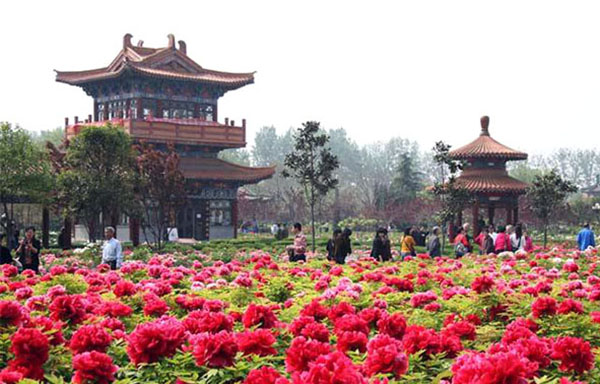- By admin
- In ChinaKnowledge
- 2018-01-08
Peonies in Chinese Art and Culture
Peonies may be small, but they are a unique flower of China, with a history that dates back thousands of years. Loved for its beauty, the peony is the national flower of China. Sometimes referred to as the “King of Flowers” or “Flower of Riches and Honors”, this flower has been highly appreciated throughout history for its large petals, beautiful shapes, bright colors and strong fragrance.
Peonies in Chinese Traditional Painting
Flowers are a common theme in general in Chinese traditional paintings, but the peony is an especially popular one. In Chinese art, the peony is a symbol of wealth, power and class; therefore it is an often-seen theme in traditional painting, silk embroidery, national clothes and decorations.
Peonies will often be drawn quite large and colorful, with the petals overlapping so that it creates a kind of three-dimensional feeling to the audience. In terms of composition, this makes the flower look quite full and gives the viewer a sense of liveliness. Bright colors, especially red, pink and purple, are often used.
Sometimes the flowers will be painted with birds, another popular theme in Chinese art; the combination of flora with fauna usually makes a picture seem livelier.
For ordinary Chinese people, paintings of peonies represented their hopes for a life full of wealth; it was an especially popular theme during the Tang Dynasty because it was a flourishing time in Chinese history, and thus catered to the cultural fashion for people during that period in time.
Peonies in Chinese Silk Embroidery and Clothing
Peonies are also a popular theme in Chinese silk embroidery. Usually stitched subtly with large colorful petals, bright peonies symbolize the richness of life. Embroiderers like to use peonies in full patterns, meaning placing peonies all over their work with no obvious blank spaces.
The flowers are sometimes embroidered alone on the cloth; other times they are accompanied by birds, especially phoenixes, regarded the luckiest bird in Chinese culture. There is a saying in Chinese culture: peonies and phoenixes together are a symbol of ultimate happiness and richness, as the peony is king of the flowers and the phoenix is king of the birds.
Due to their auspicious connotations, many Chinese women like to wear clothing with peony patterns, including on traditional clothes like the qipao and dresses. Scarves with these patterns are also welcomed, usually bright in color with eye-catching petals.
Peonies in Chinese Art and Decoration
Peonies are commonly found patterns on vases and home decorations. The peony acts as an amulet, believed to bring people good luck and audacious feelings. People believe that with these decorations, they will be kept safe and sound, in addition to having a better chance at attaining money, status and happiness.
The presence of flowers can definitely make one feel happier, and the peony is among the most popular flowers loved by people around the world. Since first existing in Chinese culture, the peony has since spread its influence to the other parts of the world, bringing luck and delight to all those who own this beautiful flower at home.
Peonies in Other Cultures
Around the eighth century, the Chinese introduced the peony to Japan, where local craftsmen and artists would depict the flower in their paintings, porcelains and other art forms. It was also cultivated as a garden plant, its root used for convulsions. Today it is regarded as the “prime minister of flowers" and symbolizes good fortune and bravery in Japanese culture; thus the peony is also a common theme found in Japanese art.
In western culture, the peony is named after the Greek god of medicine and healing, Paeon. Western artists also use peony as the theme for artistic creation such as oil painting.
Related destinations
Why Choose Us?
We are the top Silk Road tour operator based in Dunhuang, China. We focus on providing well designed Silk Road China Tours with resonable price and thoughtful service.
- Easy & carefree booking
- The best value
- Great travel experience
- Locally operated
Hot Tours
-

6 days Gansu tour to Binglingsi, Xiahe and Langmusi
Tour type : Private tour Price : from *** Destinations : Lanzhou - linxia - Xiahe - Langmusi - Hezuo - Lanzhou -

12 Days Gansu Highlights Tour
Tour type : Private tour Price : from *** Destinations : Xian – Tianshui – Lanzhou – Xiahe – Langmusi – Hezuo – Zhangye – Jiayuguan - Dunhuang -

10 Days Silk Road Classic Tour
Tour type : Private tour Price : from *** Destinations : Xian - Zhangye - Jiayuguan - Dunhuang - Turpan - Urumqi -

5 Days Zhangye - Alxa youqi Highlights Tour
Tour type : Private Tour Price : from *** Destinations : Zhangye - Alax youqi - Zhangye


